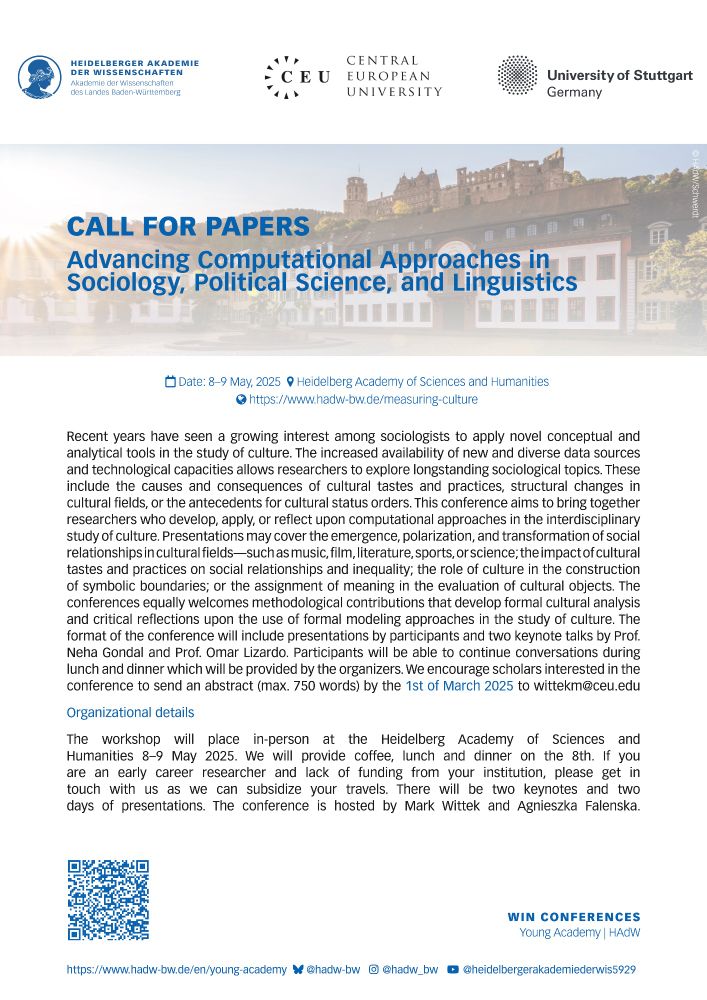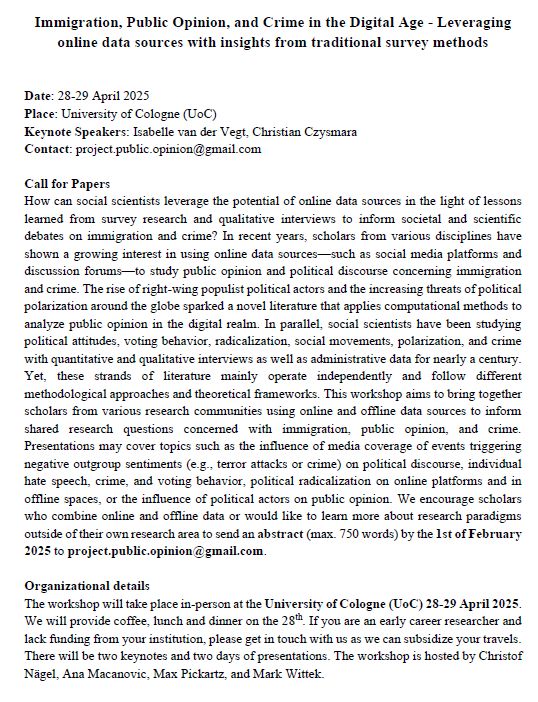Hi! Noticed the link in this post goes to a different job. I think this is the correct one: www.gesis.org/en/institute...
10.07.2025 07:47 — 👍 1 🔁 0 💬 0 📌 0@hasselhorn.bsky.social
@hasselhorn.bsky.social
Hi! Noticed the link in this post goes to a different job. I think this is the correct one: www.gesis.org/en/institute...
10.07.2025 07:47 — 👍 1 🔁 0 💬 0 📌 0Kleine Anmerkung: Ich wurde in diesem Beitrag verlinkt, bin aber nicht die angesprochene Person. Die Kritik an sich möchte ich damit aber nicht schmälern.
15.05.2025 06:52 — 👍 1 🔁 0 💬 0 📌 1
🎺Join us in May 2025 for our conference on "Measuring Culture with Computational Methods" at the Heidelberg Academy of Sciences @hadw-bw.bsky.social
Including two amazing keynotes by @nehagondal.bsky.social and @olizardo.bsky.social
Abstract (max. 750 words) to wittekm@ceu.edu
Deadline: 01.03.25
Interested in a free seminar? To mark our first semester on Bluesky, we’re offering a free seminar from our Spring offerings (through May 31) to one lucky winner. Follow us and repost this message by Monday, February 10 to enter. Winner revealed on Feb. 14—may the odds be in your favor!
03.02.2025 13:39 — 👍 8 🔁 12 💬 1 📌 1
In a just published paper Beth Hardie and Chae Rose present a systematic review of studies of SATs situational model. They conclude that "the empirical support for SAT's situational model continues to grow" but also discuss suggested testing improvements.
Link: journals.sagepub.com/doi/10.1177/...

Immigration, Public Opinion, and Crime in the Digital Age - Leveraging online data sources with insights from traditional survey methods How can social scientists leverage the potential of online data sources in the light of lessons learned from survey research and qualitative interviews to inform societal and scientific debates on immigration and crime? In recent years, scholars from various disciplines have shown a growing interest in using online data sources—such as social media platforms and discussion forums—to study public opinion and political discourse concerning immigration and crime. The rise of right-wing populist political actors and the increasing threats of political polarization around the globe sparked a novel literature that applies computational methods to analyze public opinion in the digital realm. In parallel, social scientists have been studying political attitudes, voting behavior, radicalization, social movements, polarization, and crime with quantitative and qualitative interviews as well as administrative data for nearly a century. Yet, these strands of literature mainly operate independently and follow different methodological approaches and theoretical frameworks. This workshop aims to bring together scholars from various research communities using online and offline data sources to inform shared research questions concerned with immigration, public opinion, and crime. Presentations may cover topics such as the influence of media coverage of events triggering negative outgroup sentiments (e.g., terror attacks or crime) on political discourse, individual hate speech, crime, and voting behavior, political radicalization on online platforms and in offline spaces, or the influence of political actors on public opinion. We encourage scholars who combine online and offline data or would like to learn more about research paradigms outside of their own research area to send an abstract (max. 750 words) by the 1st of February 2025 to project.publ…
If you use online or survey data to study immigration, public opinion, or crime, consider sending an abstract for our workshop on April 28/29 2025 at the University of Cologne. We will have great keynotes by @christian.czymara.com and @isabellevdv.bsky.social! See the call below:
15.01.2025 12:26 — 👍 10 🔁 7 💬 1 📌 2